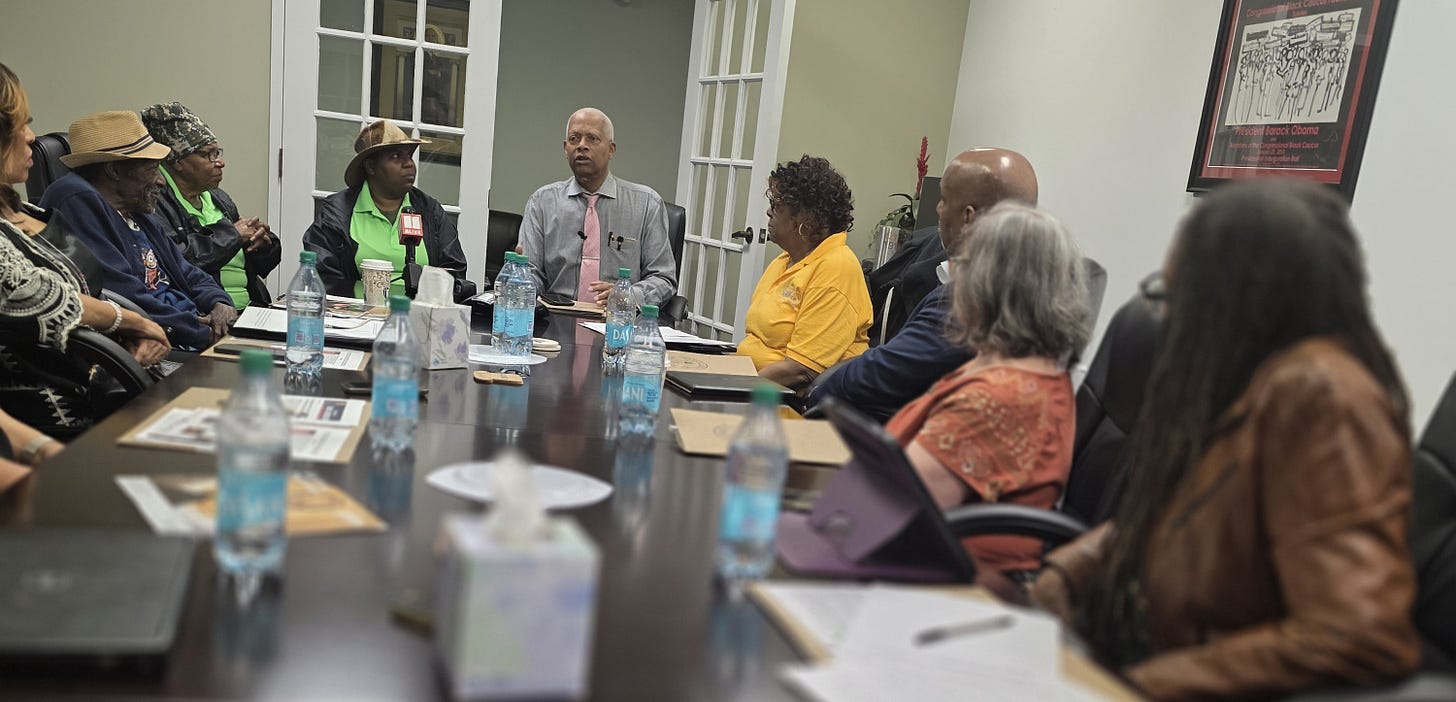Bracing For A Medicaid Mauling
Democrats are looking for a knife fight, while Republicans hold a chainsaw.
I found it curious that both Congressman Hank Johnson and Congresswoman Nikema Williams both scheduled events about Medicaid cuts on the same day. It turns out that appears to have been a play by Democratic leaders to shift focus after the deflating capitulation of Senate minority leader Chuck Schumer on the budget continuing resolution last week.
Democratic lawmakers in Arizona, Colorado, California, Pennsylvania, and elsewhere held events Tuesday for a “Medicaid day of action,” meant to draw attention to the long-term legislative threats … and away from Democrats’ short-term defeat.
That said, people are still pretty raw. Not the full-contact constituent pimp-slapping kind of raw that Rep. Rich McCormick ate last month. But still.
“I heard you use the word ‘concerned’ earlier, and that concerns me,” said Michael Beach, a resident of the Druid Hills area of Atlanta. “Because I’ve moved from concerned to appalled to pissed about what’s going on. … Look at what’s happening today. Court defiance, basically. Congress; I’m sorry, but most of the people in your house are neutered right now.”
Beach, like many showing up to meetings like this, didn’t come for group therapy. He’s looking for a plan, he said. “I need specifics. Give me some specifics about what I can do in this community. Because right now it’s about us that are going to change this because I don’t see it happening in Washington,” he said.
When Republicans offered their 10-year budget blueprint — that’s for the actual budget, not the bailing-wire and chewing-gum continuing resolution passed last week — Democrats asked the nonpartisan Congressional Budget Office to score part of it. The response to that request came back on March 5, showing that there was no way to meet the targets for spending reductions over that period without cuts of about $880 billion.
Projections vary, but the Kaiser Family Foundation argues that proposed cuts could reduce Medicaid spending by 12 to 25 percent. Considering that Medicaid represents about 20 percent of all medical spending, that’s up to a 4 percent cut to health spending in America landing on the least healthy, most vulnerable people in America.
The average congressional district has about 761,000 people in it. All but one of Georgia’s 14 districts have more than 100,000 people receiving Medicaid benefits or CHIP — medical coverage for children. All but three have more than 150,000. More than half of beneficiaries are children.
The media focused on the spectacle of Rep. Al Green being dragged away from the address before a joint session of Congress a few weeks ago as he was waving his cane and screaming at Donald Trump, but this report is what he was screaming about.
Georgia is one of 10 states that never expanded Medicaid eligibility under the Affordable Care Act. Under the expansion, the federal government would pick up 85-90 percent of the cost for new enrollees. According to an estimate from the Georgia Budget and Policy Institute in 2023, Georgia would spend about $239 million a year under expansion. An Urban Institute paper estimated about 300,000 fewer people would be uninsured in Georgia.
Instead, Georgia uses a case study in political sadism called Pathways to Coverage. It gives Medicaid coverage to low-income, non-disabled, non-pregnant adults in Georgia who meet certain requirements like completing at least 80 hours per month of qualifying activities like work, education, or volunteering.
Pathways … is bullshit. If the goal is getting people coverage, it doesn’t work. It is designed not to work. Fewer that 7,000 people are enrolled, two years in.
The rationale offered by Gov. Brian Kemp has been that proper Medicaid expansion would leave Georgia on the hook for additional spending in the event that the federal government reneged on its side of the deal. And honestly, it’s hard to argue that he was wrong there, because that’s exactly what it looks like the feds want to do.
Trump and Speaker Mike Johnson argue that services won’t be cut, just “fraud, waste and abuse.” There’s no mechanism in the budget framework for distinguishing service reduction from waste, however. The number is just smaller.
“Now, why would they want to to impose this kind of pain and suffering on the people? “ Johnson asked the group of seniors, Medicaid case workers and health care advocates rhetorically. “Well, it's because they want to cut taxes for wealthy individuals and corporations. They want to find a way of diverting taxpayer money into a handout to billionaires.”
Democrats’ primary message is that the cuts to Medicaid implied by the Republican budget proposal should provoke the kind of backlash that realigns politics, but the president and Congress are grinding on the third rail of politics like it’s a Sybian anyway because everyone is scared to death of them. Or so they think.
“We all in America are living in a unprecedented state of fear. For whatever reason, those hospital and nursing home administrators are living under the threat that if they speak up, if they raise their head to protest or to say something that is out of keeping with the people who are in charge, then they will get punished,” Johnson said. “So they're actually afraid to be here today,”
There are only so many places a cut to Medicaid could land. Nursing homes and personal care services are at the top of the list because that’s where most of the money is spent.
A personal care home is the least expensive option for someone who is medically vulnerable, poor and on Medicaid, said Nadine Johnson from Care One Franchise, a senior home facility in Georgia. Social security benefits usually aren’t enough to cover services in a personal care home. Medicaid provides a subsidy, which in Georgia requires a waiver. That’s the low hanging fruit in a cut, she said.
“I'm sure, absolutely sure, that with the cuts that are being proposed, that would be one of the services that they would lose,” Nadine Johnson said. “ If they can't be in personal care homes, they're going to be in nursing homes. But then the nursing home is also affected, so it's a ripple effect.”
The end result is homelessness. The people we see on the street that should be in a personal care home will have new neighbors.
As an aside: when I speak to Republicans outside of the metro areas, I find that they tend to be more concerned about homelessness than you might think, both with what they see in big cities like Atlanta and in their own communities. Homelessness is a glaring symbol of government inefficiency and failure for working-class Republicans.
And yet, progressive leaders can’t figure out how to connect the dots for them: Medicaid cuts cause homelessness. If Democrats can’t sell that reality to voters who already despise the sight of encampments, they have only themselves to blame.
Democrats know they’re not the most popular people in the world right now, but at least they’re willing to meet with their constituents and take a beating.
At Williams’ town hall at the Teamsters’ building in Atlanta, Robert Boom held up a letter from Medicaid rescinding his Medicaid eligibility because he made too much money, His medicine costs $1000, he said. The second costs $300.
“Bottom line is, I’m tired,” he said. He works. He votes.
“I supported Kamala Harris. I voted for her. I donated to her,” Boom said. “I don’t even know. I don’t trust the government any more. With all due respect Miss Williams, why should I? Why should I trust them? Why should I trust any of you?”
I keep looking for a battle plan from Democrats. Tactics can be seen. Strategy remains elusive.





